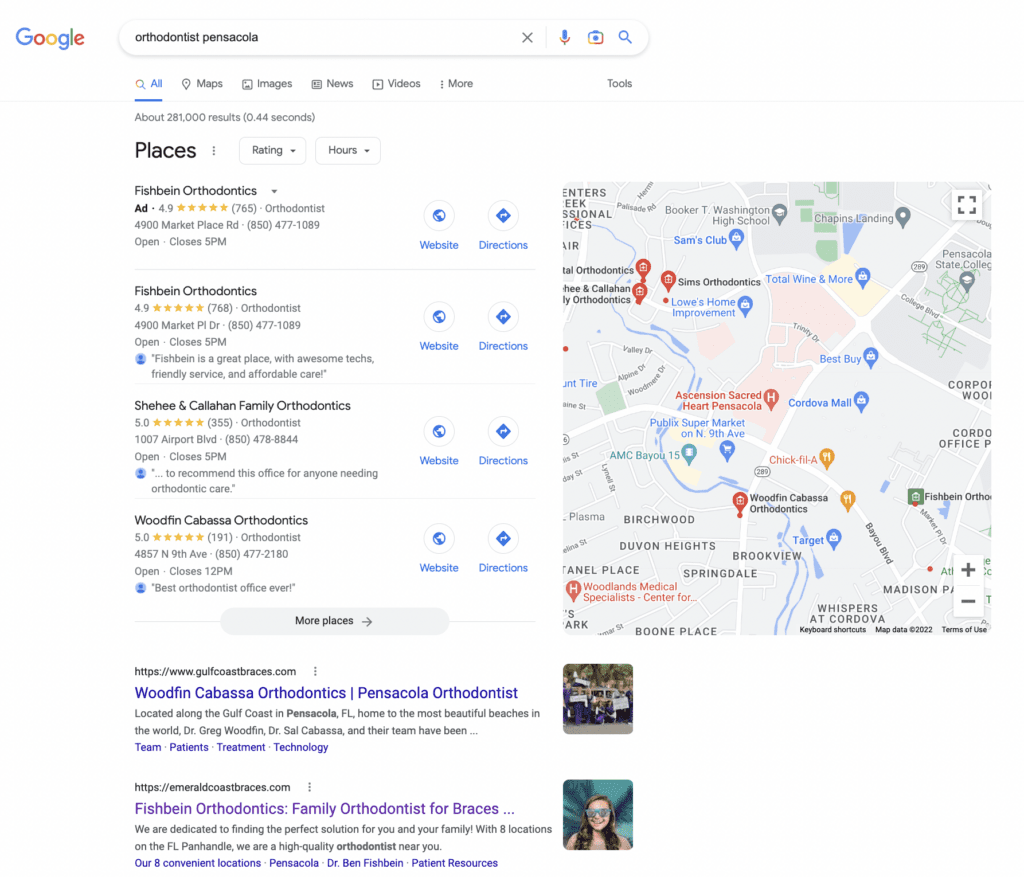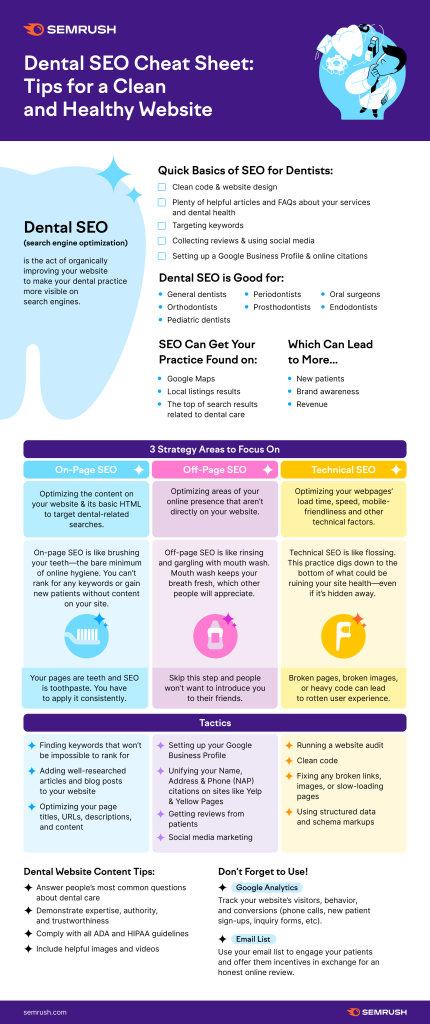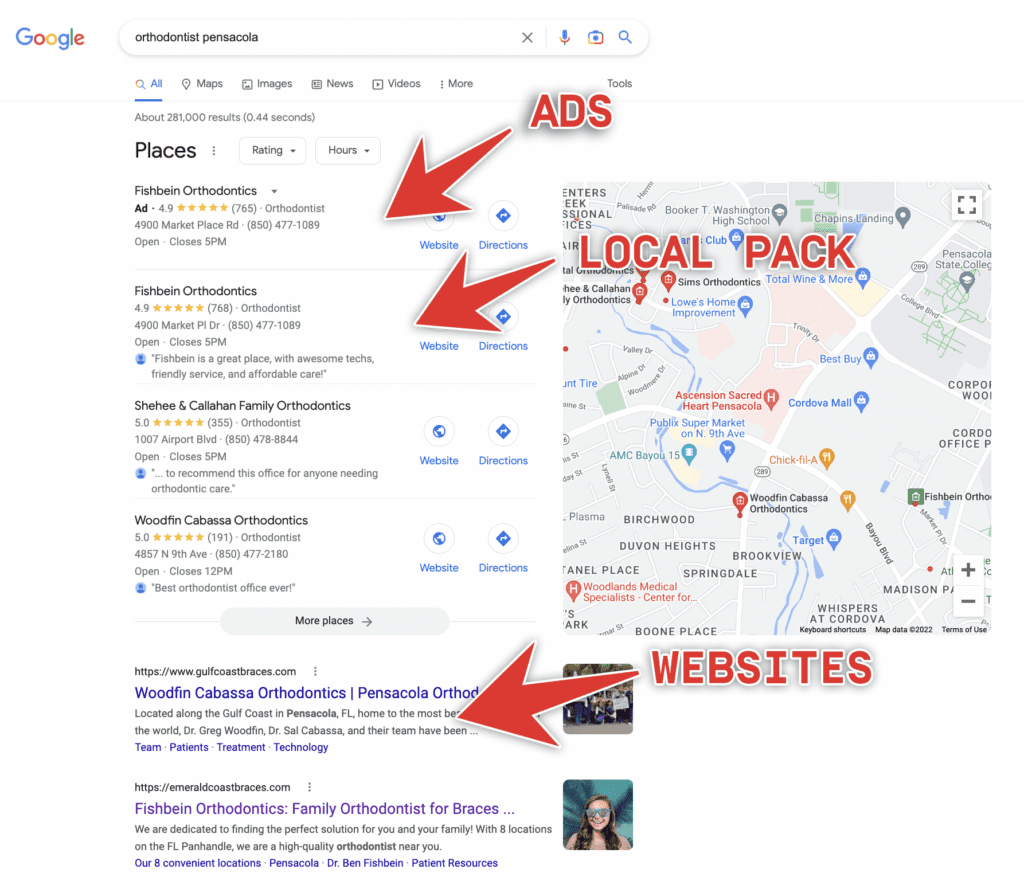Are you an orthodontist looking to boost your online presence? Have you ever wondered how potential patients find you on the internet? Well, we’ve got some good news for you – SEO can help! SEO, or Search Engine Optimization, is a crucial tool for any orthodontist who wants to increase their visibility on search engines like Google. In this article, we’ll dive deeper into the importance of SEO for orthodontists and how it can benefit your practice. So, if you’re ready to take your online marketing strategies to the next level, keep reading!
When it comes to finding a local orthodontist, most people turn to search engines for help. Whether they need a consultation or are simply researching different treatment options, the internet is their go-to resource. This is where SEO becomes invaluable. By implementing effective SEO techniques, you can ensure that your orthodontic practice appears on the first page of search engine results, making it easier for potential patients to find you. Not only does this lead to increased visibility, but it also improves your chances of attracting new patients and growing your practice.
So, how does SEO actually work for orthodontists? Well, it involves optimizing various aspects of your website to make it more search engine friendly. This includes keyword research, on-page optimization, off-page optimization, and technical SEO. By targeting specific keywords and optimizing your website’s content, meta tags, and URLs, you can increase your chances of ranking higher in organic search results. Additionally, building backlinks and improving site speed are essential for a successful SEO strategy. Don’t worry if all of this sounds overwhelming – in our next article, we’ll break down these concepts and provide practical tips to help you get started with SEO for your orthodontic practice.
In conclusion, SEO is a powerful tool that can greatly benefit orthodontists in today’s digital world. By utilizing effective SEO strategies, you can increase your online visibility, attract more patients, and ultimately grow your practice. In our upcoming articles, we’ll delve deeper into the world of SEO, providing you with practical tips and expert advice to help you optimize your website and outrank your competitors. So, stay tuned and get ready to take your orthodontic practice to new heights with the power of SEO!

The Importance of SEO for Orthodontists
In today’s digital age, having a strong online presence is crucial for businesses across all industries, including orthodontics. With the increasing competition and the shift towards online searches, orthodontists need to ensure that their websites are easily discoverable by potential patients. One of the most effective ways to achieve this is through search engine optimization (SEO). In this article, we will explore the significance of SEO for orthodontists and how it can benefit their practices.
What is SEO?
SEO stands for search engine optimization, which refers to the practice of optimizing a website to enhance its visibility and ranking on search engine results pages (SERPs). Through various techniques and strategies, SEO aims to increase organic (non-paid) traffic to a website, ultimately driving potential patients to the orthodontist’s practice.
Why is SEO important for orthodontists?
In an industry as competitive as orthodontics, having a strong online presence can make all the difference. When people are in need of orthodontic services, their first instinct is often to search online for recommendations or information. If an orthodontist’s website does not appear on the first page of search results, it is highly unlikely that they will attract much organic traffic. This is where SEO comes into play.
By optimizing their websites for search engines, orthodontists can improve their visibility and attract more potential patients. SEO helps orthodontists rank higher on SERPs, making their websites more likely to be clicked on and visited by individuals seeking orthodontic treatments. By neglecting SEO, orthodontists risk missing out on a significant number of potential patients.
The benefits of SEO for orthodontists
-
Increased website visibility: SEO techniques such as keyword optimization, content creation, and website structure improvements can significantly enhance a website’s visibility on search engines. This increased visibility means more potential patients will come across the orthodontist’s website when searching for relevant services.
-
Targeted traffic: SEO allows orthodontists to target specific keywords and phrases that potential patients are likely to search for. By ranking for these targeted keywords, orthodontists can attract highly relevant traffic to their websites, increasing the chances of converting these visitors into actual patients.
-
Improved user experience: SEO involves optimizing various elements of a website, such as its structure, navigation, and load speed. By improving these aspects, orthodontists create a better user experience for website visitors, leading to increased engagement, longer visit durations, and lower bounce rates.
-
Long-term results: Unlike paid advertising methods, such as Google Ads, SEO provides long-term benefits. Once a website is properly optimized, it can continue to attract organic traffic for months or even years to come, without the need for ongoing payments.
-
Cost-effective marketing: In comparison to other marketing strategies, such as traditional print or television advertisements, SEO is a cost-effective solution for orthodontists. While the initial investment in SEO might require some resources, the long-term benefits often outweigh the costs, making it a valuable investment in the practice’s marketing efforts.
Optimizing Orthodontic Websites for SEO
To fully leverage the benefits of SEO, orthodontists need to optimize their websites according to best practices. Here are some key strategies for optimizing orthodontic websites for SEO.
Creating quality and relevant content
Content is king in the realm of SEO. High-quality, informative, and relevant content not only engages website visitors but also helps search engines understand what a site is about. Orthodontists should focus on creating content that addresses common patient questions, provides educational resources, and showcases their expertise in the field. Regularly updating the website with fresh content can also boost its visibility in search engine rankings.
Performing keyword research
Keyword research plays a vital role in SEO. By identifying the keywords and phrases that potential patients are using to search for orthodontic services, orthodontists can optimize their website’s content and meta tags accordingly. There are several keyword research tools available that can help orthodontists discover the most relevant and high-traffic keywords to target.
Optimizing website structure and navigation
Having a well-structured website with user-friendly navigation is not only important for user experience but also for SEO. Search engines crawl websites to understand their structure, so it’s crucial to organize content logically and create a clear hierarchy. Orthodontists should ensure that their website’s pages are easily accessible and linked together in a logical manner.
Improving website speed and performance
Website speed and performance are critical factors affecting both user experience and SEO. A slow-loading website could lead to increased bounce rates and lower search engine rankings. Orthodontists should regularly monitor their website’s speed and optimize it by compressing images, minimizing code, and utilizing caching techniques to enhance performance.

Local SEO for Orthodontists
While general SEO strategies can benefit orthodontists, it is equally important to focus on local SEO to target potential patients in the specific areas they serve. Here are some essential local SEO tactics for orthodontists.
Claiming and optimizing Google My Business listing
Google My Business (GMB) is a crucial tool for local SEO. Orthodontists should claim their GMB listing and ensure that all the information is accurate and up to date. This includes their practice’s name, address, phone number, website, and operating hours. Optimizing the GMB listing with relevant keywords and encouraging patients to leave reviews can significantly boost the practice’s visibility in local search results.
Building local citations
Local citations are mentions of a business’s name, address, and phone number (NAP) on other websites and directories. These citations help search engines verify the credibility and consistency of a business’s information. Orthodontists should ensure that their NAP information is accurate and consistent across all online platforms to improve their local SEO.
Getting positive reviews and ratings
Online reviews and ratings are crucial for any business, including orthodontic practices. Positive reviews not only build trust with potential patients but also play a significant role in local SEO. Orthodontists should encourage satisfied patients to leave reviews on platforms such as Google, Yelp, and Healthgrades. Responding to reviews, whether positive or negative, shows that the practice values patient feedback.
Targeting location-specific keywords
To target local patients effectively, orthodontists should incorporate location-specific keywords in their website’s content and meta tags. This includes mentioning the city or neighborhood they serve, nearby landmarks, and other relevant geographical information. By doing so, orthodontists improve their chances of appearing in local search results when individuals search for orthodontic services in their area.
The Role of On-Page SEO in Orthodontic Marketing
On-page SEO refers to optimizing individual webpages for search engines. By implementing the following strategies, orthodontists can improve their on-page SEO and increase their website’s visibility.
Title tag optimization
Title tags are HTML elements that define the title of a webpage. Orthodontists should ensure that their title tags accurately reflect the content of their webpages while incorporating relevant keywords. Well-optimized title tags are more likely to attract clicks from search engine users.
Meta description optimization
The meta description is a brief summary of a webpage that appears in search engine results. Orthodontists should optimize their meta descriptions by making them compelling, engaging, and relevant to potential patients. Including keywords in the meta description can also help improve search engine visibility.
Heading tags and keyword usage
Heading tags (H1, H2, H3, etc.) play a crucial role in helping search engines understand the structure and hierarchy of a webpage. Orthodontists should use heading tags strategically, incorporating their targeted keywords while maintaining a logical structure. This not only improves SEO but also enhances the readability of the content for website visitors.
URL structure optimization
Orthodontists should ensure that their website’s URLs are clean, descriptive, and include relevant keywords. Search engines use URLs to understand the content of a webpage, so optimizing them can positively impact SEO. Orthodontists should avoid long, complex URLs filled with numbers and symbols and instead opt for concise and keyword-rich URLs.

Off-Page SEO Strategies for Orthodontists
In addition to on-page optimization, orthodontists can also benefit from off-page SEO strategies. Here are some effective off-page SEO tactics for orthodontic practices.
Creating high-quality backlinks
Backlinks are links from other websites that point to a particular webpage. Search engines consider backlinks as a vote of confidence in the webpage’s reliability and authority. Orthodontists should focus on building high-quality backlinks from reputable websites in the dental or healthcare industry. This can be achieved through networking, content collaborations, and guest blogging.
Guest blogging and influencer collaborations
Guest blogging involves writing informative articles for other websites in exchange for a backlink to the orthodontist’s website. Similarly, collaborating with influencers or industry experts to create valuable content can help attract more traffic and improve search engine visibility. By sharing knowledge and insights, orthodontists can establish themselves as authoritative figures in their field.
Social media marketing for orthodontists
While social media signals may not directly influence search engine rankings, they can indirectly impact SEO efforts. Having a strong social media presence allows orthodontists to engage with patients, showcase their expertise, and share valuable content. Social media platforms also provide opportunities for others to share orthodontists’ content, which can result in increased exposure and potential backlinks.
Online reputation management
Maintaining a positive online reputation is crucial for orthodontists. Negative reviews or unfavorable online mentions can damage a practice’s reputation and potentially deter potential patients. Orthodontists should regularly monitor their online reputation, respond to patient reviews, and address any concerns promptly and professionally. By actively managing their reputation, orthodontists can build trust and credibility, positively impacting their SEO efforts.
Mobile SEO for Orthodontic Websites
With the increasing use of smartphones and mobile devices, it is essential for orthodontists to optimize their websites for mobile users. Here are some key mobile SEO strategies.
Ensuring mobile responsiveness
A mobile-responsive website adjusts its layout and design to fit different screen sizes and resolutions. Orthodontists should ensure that their website is responsive, offering an optimal experience for mobile users. Mobile responsiveness is not only crucial for SEO but also for user experience, as mobile-friendly websites tend to have higher engagement and lower bounce rates.
Optimizing for voice search
The rise of voice assistants and smart speakers has led to an increase in voice searches. Orthodontists can optimize their website’s content to target voice search queries by incorporating long-tail keywords and natural language phrases. This includes answering common patient questions and providing concise and direct answers within the content.
Mobile-friendly design and user experience
Mobile users have different needs and expectations compared to desktop users. Orthodontists should prioritize a mobile-friendly design that enhances user experience. This includes using large and easily clickable buttons, minimizing page load times, and ensuring that important information is easily accessible on smaller screens.
Localizing mobile search
Mobile searches often have a local intent, as users are frequently seeking information or services nearby. Orthodontists should optimize their mobile SEO by focusing on location-specific keywords and incorporating location-based content. This can include mentioning the city or neighborhood they serve and providing directions and contact information that is easily accessible on mobile devices.

Measuring and Tracking SEO Success
To determine the effectiveness of SEO efforts, orthodontists should measure and track key metrics. Here are some essential steps to measure and track SEO success.
Setting up Google Analytics
Google Analytics is a powerful tool that provides valuable insights into website traffic, user behavior, and conversions. Orthodontists should set up Google Analytics on their website to track important metrics such as organic traffic, bounce rates, and goal completions. This data can help orthodontists make data-driven decisions and fine-tune their SEO strategies for better results.
Utilizing SEO tools and metrics
Various SEO tools, such as Moz, SEMrush, and Ahrefs, provide valuable metrics and insights related to website performance and search engine rankings. Orthodontists should leverage these tools to monitor their website’s SEO health, track keyword rankings, and identify areas for improvement. These tools can provide valuable data to guide ongoing SEO efforts.
Analyzing website traffic and rankings
Orthodontists should regularly analyze their website’s traffic data to identify trends, patterns, and areas that require improvement. Monitoring organic traffic, referral sources, and search query data can provide valuable insights into the effectiveness of SEO efforts. Additionally, tracking keyword rankings on search engine results pages can help orthodontists understand their website’s visibility and identify opportunities for optimization.
Monitoring conversions and goals
Conversions are a crucial metric for measuring the success of SEO efforts. Orthodontists should set up conversion tracking in Google Analytics to measure the number of inquiries, appointment bookings, or other desired actions. By monitoring conversion rates and setting goals, orthodontists can better understand the impact of their SEO strategies on the practice’s bottom line.
Staying Up-to-Date with SEO Trends and Algorithm Changes
SEO is a dynamic field that constantly evolves with search engine algorithms and industry trends. To stay ahead, orthodontists should stay up-to-date with the latest SEO developments. Here are some strategies to stay informed.
Following industry blogs and news
There are numerous reputable blogs and news sources that regularly cover SEO topics and industry updates. Orthodontists should follow these blogs to stay informed about the latest trends, algorithm updates, and best practices. This allows orthodontists to adapt their SEO strategies accordingly and remain competitive in the digital landscape.
Adapting strategies to algorithm updates
Search engine algorithms frequently change, and these updates can impact website rankings and visibility. Orthodontists should closely monitor algorithm updates and adapt their strategies accordingly. Following industry experts and forums can help orthodontists understand the implications of algorithm changes and make necessary adjustments to their SEO tactics.
Exploring emerging SEO techniques
SEO is a field that continually evolves, with new techniques and strategies emerging over time. Orthodontists should explore and experiment with emerging SEO techniques to stay ahead of the competition. This can include implementing structured data markup, optimizing for featured snippets, or exploring new content formats such as video or interactive elements.
Attending SEO conferences and webinars
Attending SEO conferences and webinars can provide orthodontists with valuable insights and knowledge from industry experts. These events often cover the latest trends, strategies, and case studies, allowing orthodontists to gain practical insights and network with other professionals. Conferences and webinars can be an excellent opportunity for orthodontists to expand their SEO knowledge and stay updated on industry best practices.

Collaborating with SEO Agencies for Orthodontic Practices
While orthodontists can implement SEO strategies on their own, collaborating with an experienced SEO agency can yield significant benefits. Here are some considerations when choosing an SEO agency.
Choosing the right SEO agency
Not all SEO agencies are created equal. Orthodontists should research and evaluate different agencies to find the one that best fits their needs and goals. Factors to consider include the agency’s experience, reputation, track record, and expertise in dental or healthcare SEO. Reading client testimonials and case studies can provide insights into an agency’s ability to deliver results.
Understanding the agency’s approach and expertise
Each SEO agency may have different approaches and strategies. Orthodontists should schedule consultations with potential agencies to understand their methodologies and determine if they align with the practice’s goals. Transparent communication and regular reporting are also crucial aspects of a successful collaboration.
Setting realistic expectations and goals
Orthodontists should discuss and establish clear expectations and goals with the SEO agency. This includes defining the desired outcomes, target keywords, expected timelines, and any budget restrictions. A mutually agreed-upon plan will help align both parties and ensure that everyone is working towards the same objectives.
Tracking the agency’s performance
Throughout the collaboration, orthodontists should actively track the SEO agency’s performance. This involves monitoring key metrics, such as organic traffic, keyword rankings, and conversions. Regular meetings and reporting allow orthodontists to evaluate the agency’s effectiveness and make informed decisions about the ongoing collaboration.
Conclusion
In today’s digital landscape, SEO plays a critical role in the success of orthodontic practices. By implementing effective SEO strategies, orthodontists can increase their website’s visibility, attract targeted traffic, and ultimately grow their patient base. From optimizing website structure and content to focusing on local and mobile SEO, there are numerous avenues for orthodontists to improve their online presence and attract more patients.
Continuous efforts in SEO, combined with staying updated with industry trends and collaborating with the right SEO agency, can ultimately lead to long-term success for orthodontic practices. By understanding the significant impact of SEO and dedicating time and resources to its implementation, orthodontists can position themselves at the forefront of their industry, continuously attracting new patients and growing their practices.

